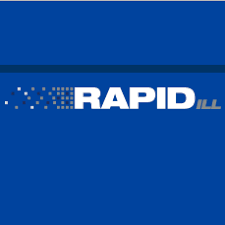Ex Libris Buys Colorado State’s RapidILL Solution
Ex Libris today announced the acquisition of RapidILL, the resource sharing system developed by Colorado State University Libraries that now provides more than 330 academic libraries in the United States, Canada, Asia, Australia, and New Zealand with interlibrary lending services for articles, returnables, and open access materials.
 Ex Libris today announced the acquisition of RapidILL, the resource sharing system developed by Colorado State University Libraries (CSU) that now provides more than 330 academic libraries in the United States, Canada, Asia, Australia, and New Zealand with interlibrary lending services for articles, returnables, and open access materials.
Ex Libris today announced the acquisition of RapidILL, the resource sharing system developed by Colorado State University Libraries (CSU) that now provides more than 330 academic libraries in the United States, Canada, Asia, Australia, and New Zealand with interlibrary lending services for articles, returnables, and open access materials.
“Even ARL [Association of Research Libraries] members are struggling to maintain collections budgets for journals, and [interlibrary loan (ILL)] is going to become even more important in the future,” Pat Burns, CSU’s Dean of Libraries and VP for Information Technology, told LJ. RapidILL “is 22 years old in terms of development, and we’ve been able to incrementally develop it over time. But it’s to the point now where our road map is going to require an infusion of development resources” beyond what CSU or RapidILL’s member libraries would be able to provide, he explained. “We think this is going to be better for the Rapid product itself” in terms of both development and expansion of its member base to potentially “thousands of libraries.”
RapidILL will be fully integrated with Ex Libris’s Alma Library Services Platform (LSP) and Primo discovery solution, but will also continue to be offered as a standalone service compatible with LSPs, integrated library systems (ILS), and other products from competing vendors.
“We’re going to continue to be open to all customers, no matter what ILS” an institution uses, Ex Libris Corporate VP for Resource Management Dvir Hoffman told LJ, noting that about 50 percent of RapidILL libraries were already Alma customers, and emphasizing that Ex Libris aims to grow RapidILL’s user base substantially. “There is going to be absolutely no change in policies. On the contrary, we will continue to invest in integrating with any ILSes, with any other broker [ILL] systems. We strongly believe in [RapidILL’s] direction.”
Burns described the pressure that most ARL libraries have been under recently to maintain journal subscriptions with flat or shrinking budgets in the face of regularly increasing prices, noting that it was a major factor motivating RapidILL to scale up.
“It’s the 80/20 rule when you start cancelling a big deal [subscription]—for 20 percent savings, you lose 80 percent of access,” he said. “I worked with ARL to do some surveys of ARL institutions, and even those, the best libraries in North America, only one in seven of them had budgets to keep in place or enhance their collections for new needs. So six out of seven were struggling with budgets for journals. And, of course, whenever [libraries] cancel and lose that collection, we say to faculty, ‘we will get you whatever you need via [ILL].’ And Rapid does, I think, the highest quality [ILL] delivery service for articles. That’s a key strategy, and as we continue to see pressures—state budgets [for higher education] shrinking, and library budgets shrinking commensurately. It’s just going to become more important for [ILL] delivery” to fill those gaps.
Hoffman said that all RapidILL institutions would see benefits from the acquisition soon, with plans to streamline back-office processes. “More automating the harvesting of holdings data, more predictability, more reports and insights,” he said. “This is an area where we are planning to invest, as we plan to increase the install base and presence of Rapid worldwide. It needs to come with a wealth of management and analytics capabilities.”
Current Ex Libris Alma and Primo customers “can use Alma in conjunction with Rapid. We are planning to have more streamlined processes,” Hoffman said, describing RapidILL rerouting document delivery requests under the hood based on availability as one example. “We are going to keep RapidILL available for all customers, Alma and non-Alma alike, but we are also going to keep up with the expectations of [Alma] customers who really want to benefit by having a much more streamlined process between the products.”
RELATED
ALREADY A SUBSCRIBER? LOG IN
We are currently offering this content for free. Sign up now to activate your personal profile, where you can save articles for future viewing









Add Comment :-
Comment Policy:
Comment should not be empty !!!